![Thanking those who dream of a united world]()
Oct 10, 2017 | Non categorizzato
 30th September 2017
30th September 2017
Dear all, During our international meeting at Castel Gandolfo, we have been able to see all that the charism of unity is doing in the world and deepen our identity as the Work of Mary. At the end of the meeting, we felt a great desire to reach out to each one of you who, in various ways, have adhered to and live the Ideal and who, in the most varied situations, make your own contribution to building up fragments of fraternity wherever you are. We realised there are so many people to whom we owe gratitude and recognition, since you have loved, suffered and given your life to build up this reality. From the depths of our hearts, we want to say a huge thank you to everyone, without forgetting those who, while not considering themselves an active part of the Movement today, continue to live their daily lives motivated by Chiara’s same Ideal. We are certain that Mary, Mother of the Movement and of us all, will help us go forward together on the journey towards the unity of the human family, as witnesses to her love, wherever we are. Considering all of us, in all we are doing and living, as little knots in a great net, we embrace you all.
Emmaus and everyone
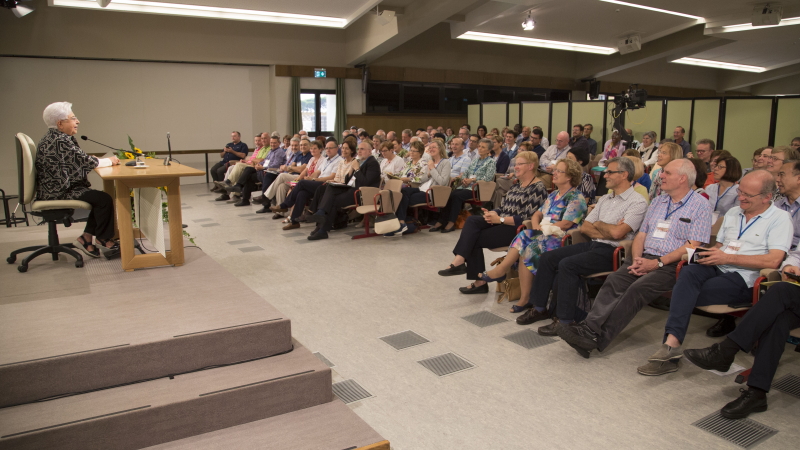
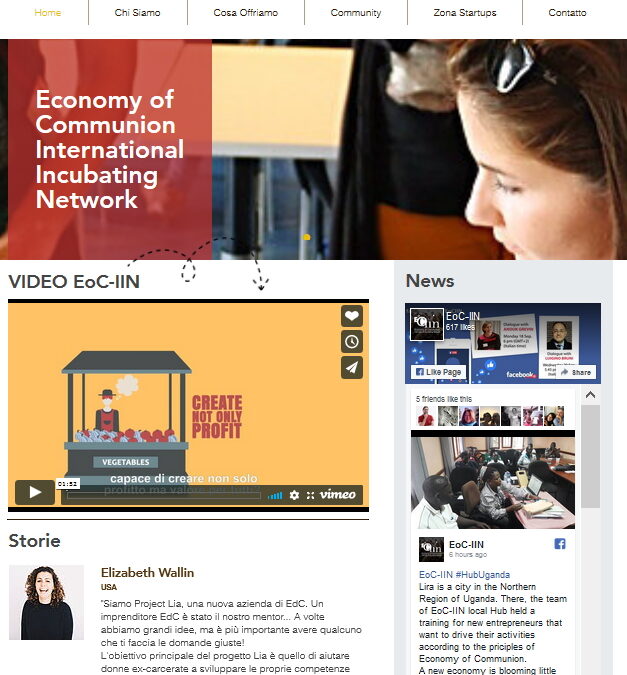
Oct 9, 2017 | Non categorizzato
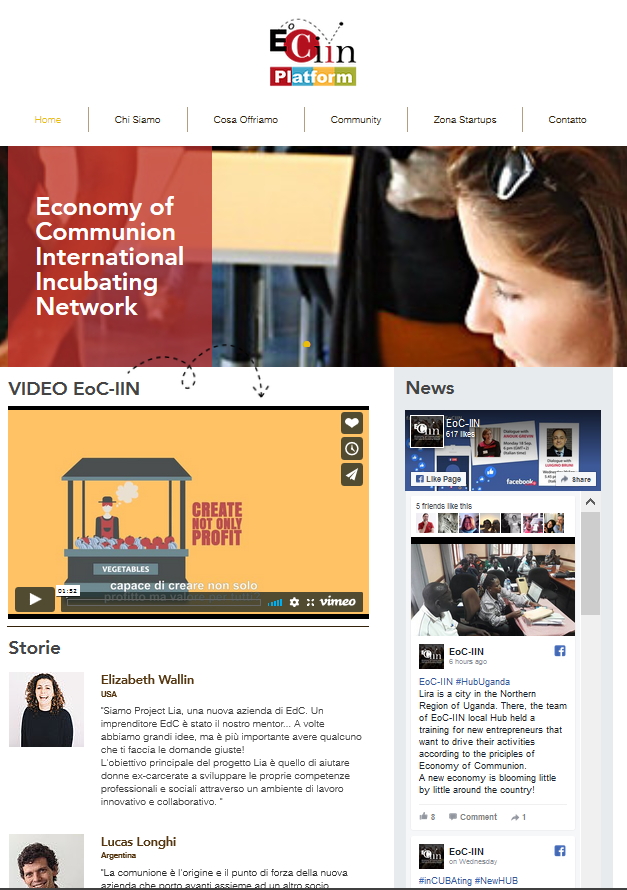 Don’t let the unpronounceable acronym scare you: with the help of a simple, straightforward and brightly coloured graphic design, it is proving to be very useful to the international community of EdC entrepreneurs who wish to share their own talents and experience to boost the growth of new enterprises. The portal addresses business companies, cooperatives, small enterprises, associations with positive social impact, and also people who want to conduct their own companies in conformity with the principles of ethics, social and environmental responsibility and inclusion. The platform offers various services like start-ups, but is likewise a bridge with the entire international community which all can become a part of. It is not difficult to do so, and thanks to the portal, every new entrepreneur driven by a spirit of cooperation and reciprocity, can benefit from distance tutoring or personal mentoring to develop his/her own project. The offer goes through the network of national Hubs. These are “access points,” network “junctions” currently present in 13 countries (Africa, Central America, South America and Europe). The online launch of the platform came about a year after the opening of the first Hub. In this span of time, the Hubs have multiplied, promoting local courses and technical-professional training workshops and in-depth studies on the values that imbue the EoC project, giving personalized and systematic support to the execution of new business projects. If up to now the action of Hubs could only address people in a limited territorial field, these same opportunities are offered today, also to those who are not physically close to a local Hub, thanks to the platform (in Spanish, Portuguese, German, Italian, French and English). Roylán, a telecommunications and electronics engineer of the Spanish Hub, explained: “Transmitting the basic notions of entrepreneurial language and adequately and concretely encouraging the new entrepreneurs who are undergoing moments of uncertainty and doubts is an enriching challenge. Upon coordinating the appointments and tasks of the people who voluntarily cooperate with the start-ups, I was able to appreciate the contributions of each one: there are huge potentials when we work together, driven by the common call to the Economy of Communion.” Each Hub has its own story to tell. The Hub of Mexico, for example, was born from the encounter between some economic activities of the territory that wanted to develop at small-enterprise levels and the EoC incubation programme. Enrique, producer of homemade jams, participated in the first incubation workshop in Mexico City. ”The incubation session helped me to grow in a short time and transform my activity into a real business. But at the same time it enhanced my personality and the deep growth in the EoC culture. The biggest change for me was to start generating communions starting from my business, and helping vulnerable people. When the business grows, we will be able to offer jobs to needy, disabled people or those who couldn’t find jobs elsewhere. Technically speaking, it helped me to improve the production and conservation processes of the products, improving quality. We are now formalising all the licenses necessary to enter more decisively into the market.” Within the platform there is a “reserved area” for entrepreneurs who wish to join the EoC community. There are three different environments: “Networking,” to present one’s own projects, and meet other entrepreneurs and exchange experiences; “Wiki Toolkit,” to share articles and videos, and “Digital Incubation,” addressing those who have projects that have no possibility of being implemented locally. See the EoC-IIN site Source: EoC online
Don’t let the unpronounceable acronym scare you: with the help of a simple, straightforward and brightly coloured graphic design, it is proving to be very useful to the international community of EdC entrepreneurs who wish to share their own talents and experience to boost the growth of new enterprises. The portal addresses business companies, cooperatives, small enterprises, associations with positive social impact, and also people who want to conduct their own companies in conformity with the principles of ethics, social and environmental responsibility and inclusion. The platform offers various services like start-ups, but is likewise a bridge with the entire international community which all can become a part of. It is not difficult to do so, and thanks to the portal, every new entrepreneur driven by a spirit of cooperation and reciprocity, can benefit from distance tutoring or personal mentoring to develop his/her own project. The offer goes through the network of national Hubs. These are “access points,” network “junctions” currently present in 13 countries (Africa, Central America, South America and Europe). The online launch of the platform came about a year after the opening of the first Hub. In this span of time, the Hubs have multiplied, promoting local courses and technical-professional training workshops and in-depth studies on the values that imbue the EoC project, giving personalized and systematic support to the execution of new business projects. If up to now the action of Hubs could only address people in a limited territorial field, these same opportunities are offered today, also to those who are not physically close to a local Hub, thanks to the platform (in Spanish, Portuguese, German, Italian, French and English). Roylán, a telecommunications and electronics engineer of the Spanish Hub, explained: “Transmitting the basic notions of entrepreneurial language and adequately and concretely encouraging the new entrepreneurs who are undergoing moments of uncertainty and doubts is an enriching challenge. Upon coordinating the appointments and tasks of the people who voluntarily cooperate with the start-ups, I was able to appreciate the contributions of each one: there are huge potentials when we work together, driven by the common call to the Economy of Communion.” Each Hub has its own story to tell. The Hub of Mexico, for example, was born from the encounter between some economic activities of the territory that wanted to develop at small-enterprise levels and the EoC incubation programme. Enrique, producer of homemade jams, participated in the first incubation workshop in Mexico City. ”The incubation session helped me to grow in a short time and transform my activity into a real business. But at the same time it enhanced my personality and the deep growth in the EoC culture. The biggest change for me was to start generating communions starting from my business, and helping vulnerable people. When the business grows, we will be able to offer jobs to needy, disabled people or those who couldn’t find jobs elsewhere. Technically speaking, it helped me to improve the production and conservation processes of the products, improving quality. We are now formalising all the licenses necessary to enter more decisively into the market.” Within the platform there is a “reserved area” for entrepreneurs who wish to join the EoC community. There are three different environments: “Networking,” to present one’s own projects, and meet other entrepreneurs and exchange experiences; “Wiki Toolkit,” to share articles and videos, and “Digital Incubation,” addressing those who have projects that have no possibility of being implemented locally. See the EoC-IIN site Source: EoC online

Oct 8, 2017 | Non categorizzato
 For some time, the church of Santa Maria Maggiore in Trent, Italy, has been wanting to install a commemorative plaque to show visitors from around the world that Chiara Lubich was baptized there. The request from the parish priest was received favourably by Focolare’s president, Maria Voce, and so a commemorative plaque (stele) was created near the baptismal font. It is a simple, meaningful sign that, along with a photo of the young Chiara Lubich, there is also one of her inspirational sayings that sums up the charism she received: “One thing is clear in our hearts: God wants unity from us. We live to be one with God, with each other and with everyone. This splendid calling connects us to heaven and immerses us in a universal brotherhood.”
For some time, the church of Santa Maria Maggiore in Trent, Italy, has been wanting to install a commemorative plaque to show visitors from around the world that Chiara Lubich was baptized there. The request from the parish priest was received favourably by Focolare’s president, Maria Voce, and so a commemorative plaque (stele) was created near the baptismal font. It is a simple, meaningful sign that, along with a photo of the young Chiara Lubich, there is also one of her inspirational sayings that sums up the charism she received: “One thing is clear in our hearts: God wants unity from us. We live to be one with God, with each other and with everyone. This splendid calling connects us to heaven and immerses us in a universal brotherhood.”
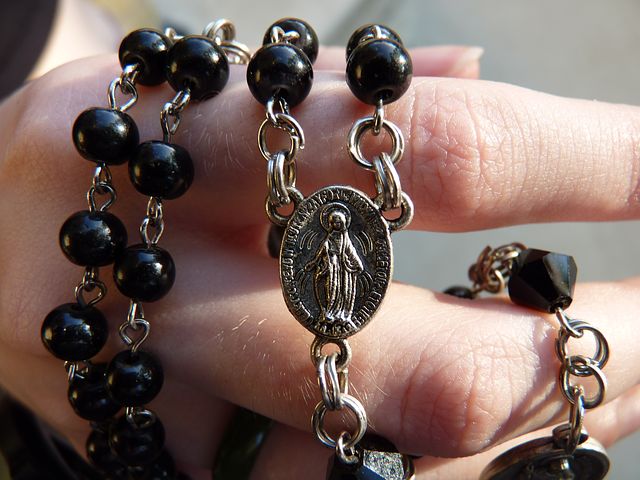
Oct 7, 2017 | Non categorizzato
 “The rosary is the drama of the Redemption seen through the eyes of Mary, virgin and Mother: the joys of Nazareth, the light of Bethlehem, the actions of Joseph, then the tragedy of the cross, and finally the heavenly glory. These are made family patrimony, they belong to us. They are our story, our life.” (Igino Giordani, Una stella accesa nella notte, (A star shining in the night) Città nuova, Roma, 2004, p. 81). 1922-1925. “If it is not possible in the pure stillness of vespers in our grandparents’ house, with a great blaze in the hearth, to gather in prayer with forefathers, grandchildren, children, and relatives: let us pray the Rosary in trams, in steamships, in the rumble of a tunnel and in the agitation of a locomotive: our effort to escape in an impetus of spirituality from the rampage of mechanized matter will be more commendable. A quarter of an hour in church will not be a sleepy habit and our prayer will be a fountain of respite in the gruelling heat of the civilization forced upon us.” (Igino Giordani, Diario di fuoco, (Diary of Fire) Città Nuova, Roma, 2005 [1980] p.19). 1933. “The Mother…There is an especially appreciative prayer to her, which represents a series of the mysteries of the life of Jesus cited with titles in her honour: the Rosary. It leads to serenity in the tired and sombre evening hours, in the arduous hours of life, and gives strength to hope in tomorrow and begin again: that coarse chain of cheap pearls transmits currents of celestial life into the poor bones exhausted by effort, lighting once again the only light in souls bombarded by social injustices or multiple misfortunes. It also gives to whoever lives, the hope of reaching the Father, of death with immortality, of the finite with Eternity.” (Igino Giordani, Diario di fuoco, cit. p.28) 1 October 1945. “Why does Mary mean so much to us? Because for us, those who truly follow the Gospel feel and act as children, for whom their mother is everything, and fills their every need. She is sought after because she leads them to God. They take her hand, they hold onto her skirts, because she leads them to the Father. There is no more reassuring, more loving or more beautiful way to present oneself to Him. Furthermore, in our Mother’s company, everything in life is more beautiful: Nature laughs, men themselves no longer seem savage.” (Igino Giordani, Diario di fuoco, cit. p.68) 9 October 1965. “I have only to see an image of Mary, so that the most beautiful things in my life come to mind. I then see that the joy of existence is called Mary for me; my glory is She, my strength is Her motherhood; the beauty that fascinates me is Her virginity; the acceptance of sorrow is the participation in Her trials as the Desolate. I see no positive aspect of my existence in which She does not enter: my life is Mary. And Mary is the Mother of Jesus: it is She who gives me God, weds the soul with the Holy Spirit, bringing it closer to the paternity of the Eternal. Who will thank you, Mama?” (Igino Giordani, Diario di fuoco, cit. p.180).
“The rosary is the drama of the Redemption seen through the eyes of Mary, virgin and Mother: the joys of Nazareth, the light of Bethlehem, the actions of Joseph, then the tragedy of the cross, and finally the heavenly glory. These are made family patrimony, they belong to us. They are our story, our life.” (Igino Giordani, Una stella accesa nella notte, (A star shining in the night) Città nuova, Roma, 2004, p. 81). 1922-1925. “If it is not possible in the pure stillness of vespers in our grandparents’ house, with a great blaze in the hearth, to gather in prayer with forefathers, grandchildren, children, and relatives: let us pray the Rosary in trams, in steamships, in the rumble of a tunnel and in the agitation of a locomotive: our effort to escape in an impetus of spirituality from the rampage of mechanized matter will be more commendable. A quarter of an hour in church will not be a sleepy habit and our prayer will be a fountain of respite in the gruelling heat of the civilization forced upon us.” (Igino Giordani, Diario di fuoco, (Diary of Fire) Città Nuova, Roma, 2005 [1980] p.19). 1933. “The Mother…There is an especially appreciative prayer to her, which represents a series of the mysteries of the life of Jesus cited with titles in her honour: the Rosary. It leads to serenity in the tired and sombre evening hours, in the arduous hours of life, and gives strength to hope in tomorrow and begin again: that coarse chain of cheap pearls transmits currents of celestial life into the poor bones exhausted by effort, lighting once again the only light in souls bombarded by social injustices or multiple misfortunes. It also gives to whoever lives, the hope of reaching the Father, of death with immortality, of the finite with Eternity.” (Igino Giordani, Diario di fuoco, cit. p.28) 1 October 1945. “Why does Mary mean so much to us? Because for us, those who truly follow the Gospel feel and act as children, for whom their mother is everything, and fills their every need. She is sought after because she leads them to God. They take her hand, they hold onto her skirts, because she leads them to the Father. There is no more reassuring, more loving or more beautiful way to present oneself to Him. Furthermore, in our Mother’s company, everything in life is more beautiful: Nature laughs, men themselves no longer seem savage.” (Igino Giordani, Diario di fuoco, cit. p.68) 9 October 1965. “I have only to see an image of Mary, so that the most beautiful things in my life come to mind. I then see that the joy of existence is called Mary for me; my glory is She, my strength is Her motherhood; the beauty that fascinates me is Her virginity; the acceptance of sorrow is the participation in Her trials as the Desolate. I see no positive aspect of my existence in which She does not enter: my life is Mary. And Mary is the Mother of Jesus: it is She who gives me God, weds the soul with the Holy Spirit, bringing it closer to the paternity of the Eternal. Who will thank you, Mama?” (Igino Giordani, Diario di fuoco, cit. p.180).
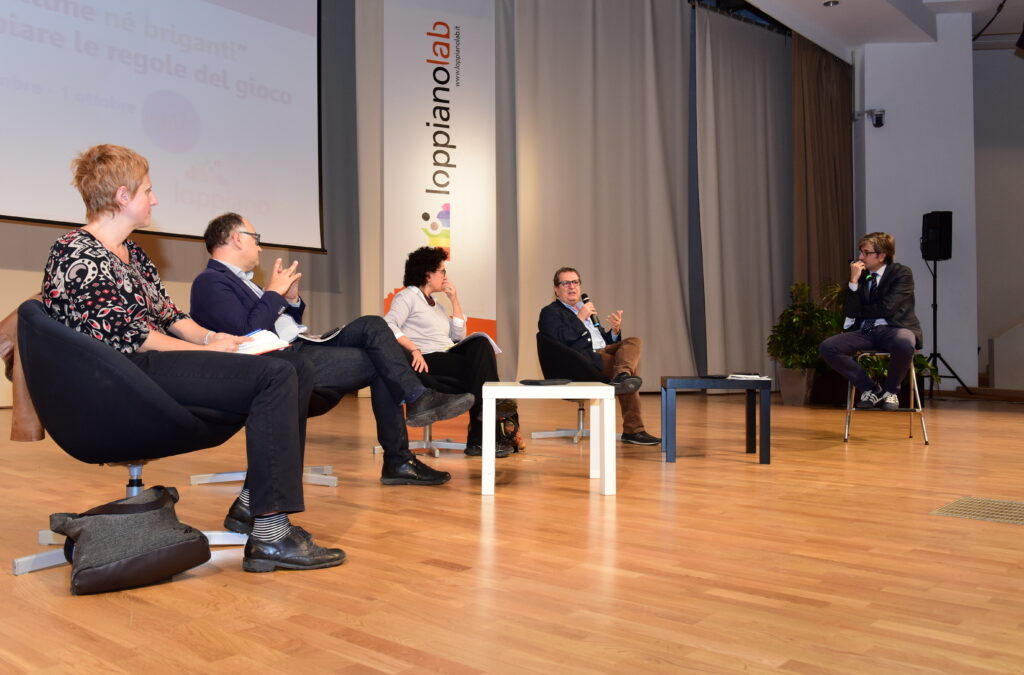
Oct 6, 2017 | Non categorizzato
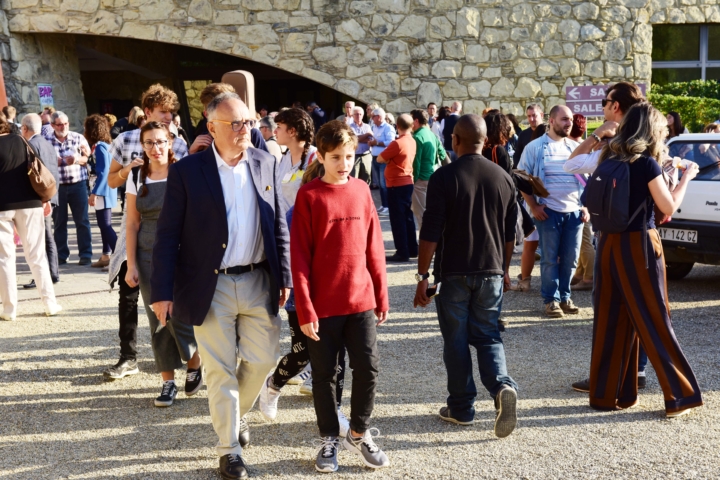 The choice of the title Neither victims nor bandits had been inspired by the words of Pope Francis during the audience last February before the representatives of the Economy of Communion (EoC), when he affirmed that it is no longer enough to imitate the Gospel’s good Samaritan who saved a man from bandits, but that there is need to act “especially before the man bumps into the bandits, to thus fight the structures of sin that produce bandits and victims.” We need, therefore, to do some soul searching and run the risks in order to change the rules of the game imposed by capitalism and globalization. World experts of culture, the media, economy and politics took turns in the various moments of the programme, along with the many representatives of civil society.
The choice of the title Neither victims nor bandits had been inspired by the words of Pope Francis during the audience last February before the representatives of the Economy of Communion (EoC), when he affirmed that it is no longer enough to imitate the Gospel’s good Samaritan who saved a man from bandits, but that there is need to act “especially before the man bumps into the bandits, to thus fight the structures of sin that produce bandits and victims.” We need, therefore, to do some soul searching and run the risks in order to change the rules of the game imposed by capitalism and globalization. World experts of culture, the media, economy and politics took turns in the various moments of the programme, along with the many representatives of civil society. 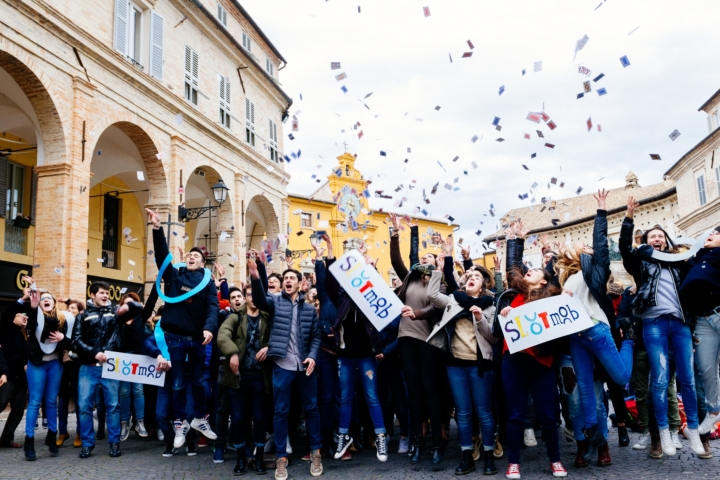 Pressing issues were discussed such as migration and reception, the reconversion of war industries and at the same time the paradox of arms exported by Italy for the war in Yemen where 15 million people have been suffering from the worst cholera epidemic over the last years and have no access to water. Another burning issue discussed was slot machine gambling, and the Slotmob movement created four years ago to stop this social wound promoted by the State itself. There were various stories: from the reports of harassment and injustice, to the efforts of those who have to fight daily against the wall of indifference and meanness, those who have decided not to allow gambling machines in their bars, and those who have promoted with friends a real march against the culture of gambling in their countries.
Pressing issues were discussed such as migration and reception, the reconversion of war industries and at the same time the paradox of arms exported by Italy for the war in Yemen where 15 million people have been suffering from the worst cholera epidemic over the last years and have no access to water. Another burning issue discussed was slot machine gambling, and the Slotmob movement created four years ago to stop this social wound promoted by the State itself. There were various stories: from the reports of harassment and injustice, to the efforts of those who have to fight daily against the wall of indifference and meanness, those who have decided not to allow gambling machines in their bars, and those who have promoted with friends a real march against the culture of gambling in their countries. 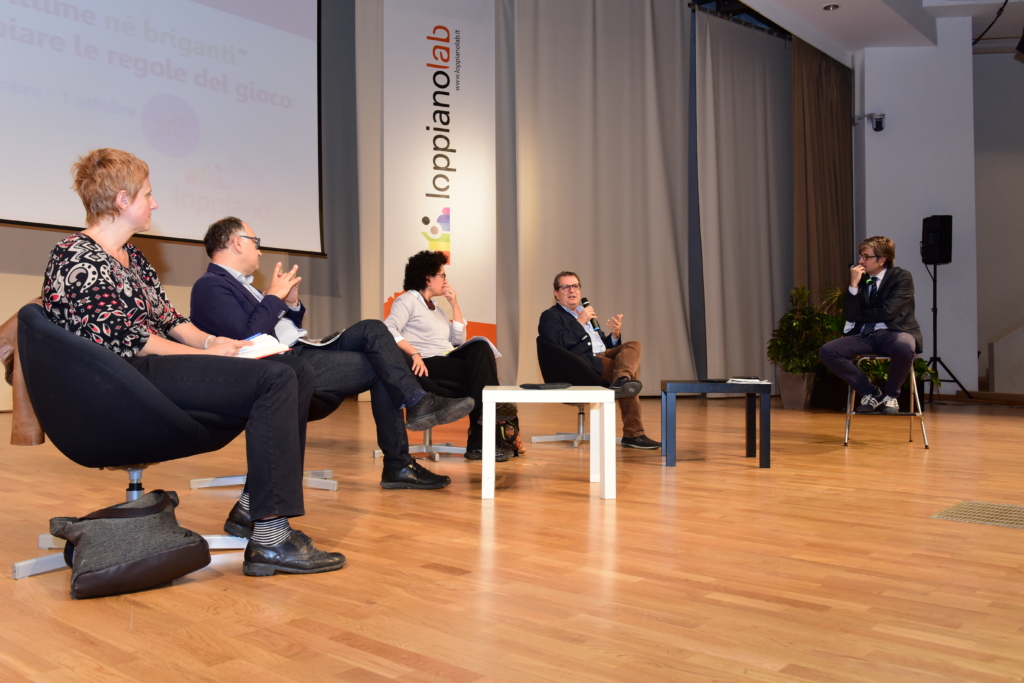 Vincenzo Conticello, a former businessman and justice witness in Palermo, spoke about the reality of a company that was reduced to bankruptcy by the racket and mafia, and how he was forced to leave his city after undergoing injustice and abuse of power. Chiara Peri of the Astalli Center for refugees, underlined that currently there is a widespread cultural commercialisation of the migrations due to which “the migrants and the poor, treated like merchandise and at times like rejects,” are to be blamed for their poverty and condition.. So here lies the paradox, “the Italians fear the victims more than the bandits.” The round table on Relational assets and work, one of the items of the event highlighted the importance of friendship, trust, company, cordiality, support, sense of belonging, and involvement – all factors that determine satisfaction in the workplace, said Prof. Benedetto Gui. What counts is not only the salary or work schedule, but to recognise the economic dignity of relational assets. Jesús Morán, Co-President of the Focolare, was at the presentation of Bernhard Callebaut’s book The birth of the Focolare. History and Sociology of a charism (1943-1965), for New City. He analysed all the work under the viewpoint of implementation as the “creative reinterpretation of tradition.” Shahrzad Houshmand, an Iranian and a Muslim theologian, also attended the book launching and gave a testimonial of how in all these years, Chiara Lubich and the Focolare Movement did not establish dialogue with religions, but with people. Chiara for Shahrzad was “a woman with the visionary faith of a person who feared nothing,” and was never afraid of meeting “the other” even if this could lead to “death of oneself.” Lastly, in the face of the continuous and obstinate aggressions to peace, the EoC economist, Luigino Bruni, and Marco Tarquinio, director of the newspaper Avvenire asked Pope Francis to write an encyclical on peace that is able to “shake off inertia.” This is what we are all hoping for!
Vincenzo Conticello, a former businessman and justice witness in Palermo, spoke about the reality of a company that was reduced to bankruptcy by the racket and mafia, and how he was forced to leave his city after undergoing injustice and abuse of power. Chiara Peri of the Astalli Center for refugees, underlined that currently there is a widespread cultural commercialisation of the migrations due to which “the migrants and the poor, treated like merchandise and at times like rejects,” are to be blamed for their poverty and condition.. So here lies the paradox, “the Italians fear the victims more than the bandits.” The round table on Relational assets and work, one of the items of the event highlighted the importance of friendship, trust, company, cordiality, support, sense of belonging, and involvement – all factors that determine satisfaction in the workplace, said Prof. Benedetto Gui. What counts is not only the salary or work schedule, but to recognise the economic dignity of relational assets. Jesús Morán, Co-President of the Focolare, was at the presentation of Bernhard Callebaut’s book The birth of the Focolare. History and Sociology of a charism (1943-1965), for New City. He analysed all the work under the viewpoint of implementation as the “creative reinterpretation of tradition.” Shahrzad Houshmand, an Iranian and a Muslim theologian, also attended the book launching and gave a testimonial of how in all these years, Chiara Lubich and the Focolare Movement did not establish dialogue with religions, but with people. Chiara for Shahrzad was “a woman with the visionary faith of a person who feared nothing,” and was never afraid of meeting “the other” even if this could lead to “death of oneself.” Lastly, in the face of the continuous and obstinate aggressions to peace, the EoC economist, Luigino Bruni, and Marco Tarquinio, director of the newspaper Avvenire asked Pope Francis to write an encyclical on peace that is able to “shake off inertia.” This is what we are all hoping for!










